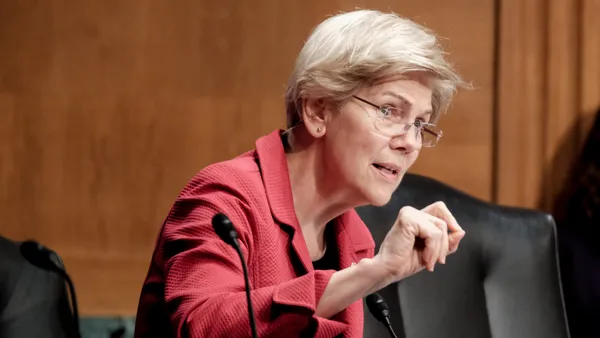Dive Brief:
- The U.S. led the world in both payments funding rounds and dollars raised during the first quarter, mostly due to digital payments darling Stripe landing $6.5 billion in March, according to a CB Insights report released Tuesday. That fintech has dual headquarters in San Francisco and Dublin.
- U.S.-based payments startups tallied 64 investments that collectively amounted to $7.1 billion in the first quarter. The U.S. notched a 40% share of global payments investment count — a five-year high — compared to Europe’s 25% and Asia’s 15%, CB Insights said. In terms of dollars, payments startups in Asia collected $600 million in the first quarter, while those in Europe drew $200 million.
- Still, there were no new payments unicorns to be found globally in the quarter, referring to startups that have been valued at $1 billion or more. That hasn’t happened since the second quarter of 2020, and it’s indicative of the more challenging funding and valuation climate payments startups have faced for the past 15 months.
Dive Insight:
Globally, payments startups raised $8.1 billion across 161 deals in the first quarter. That was triple the fourth quarter’s total, but down 2.4% year over year, CB Insights said in the State of Fintech Q1 ‘23 report.
But much of that total went to one payments startup, Stripe, which provides embedded payments processing mainly for small businesses, but also larger companies. The company raised $6.5 billion at a $50 billion valuation in March, inflating some of CB Insights’ payments statistics for the quarter.
Other U.S.-based payments startups that brought in notable amounts in the first quarter included $40 million for human resources platform Finch; $34 million for payments infrastructure company Pagos; $33 million for healthcare payment startup Paytient; and $31 million for credit card startup Parker.
Sky-high funding rounds and valuations have sagged as previously free-flowing venture capital has become more difficult to secure due to investors’ tighter purse strings. Last year, payments startups were hit hardest among fintechs: Aggregate funding value in payments fell 37%, from $30 billion in 2021 to $19 billion last year, according to data released last week from S&P Global Market Intelligence.
By fintech segment, payments startups led the pack when it came to first-quarter funding and investments, CB Insights said. Wealth tech followed with $1.8 billion across 122 investments; insurtech accumulated $1.4 billion across 106 investments; digital lending captured $1.3 billion across 112 rounds; banking collected $500 million across 52 rounds; and capital markets tech drew in $400 million across 38 investments, CB Insights said.
Stripe’s late-stage funding round was an outlier in the quarter. Sizable late-stage rounds have become increasingly rare as investors have grown more skeptical of older startups’ ability to scale and become profitable, analysts have said.
Underscoring that shift in the startup world, early-stage fundraising rounds for payments startups made up about three-quarters of all investments globally in the first quarter, reaching a five-year high, CB Insights said.
That category comprised 74% of all funding rounds in the first quarter, up from 66% for all of 2022, CB Insights said. Mid-stage and late-stage investments in the first quarter each made up 9%, while other investments comprised 8%.
Compared to 2022, average investment size in payments has more than doubled thus far this year, to $59.4 million, while the median deal size has dropped from $5 million to $4 million.
Globally, there were 10 payments mergers and acquisitions in the first quarter, compared to 11 in the fourth quarter of last year. Initial public offerings and special purpose acquisition company exits zeroed out for the most recent quarter, as they had in the prior quarter as well.












